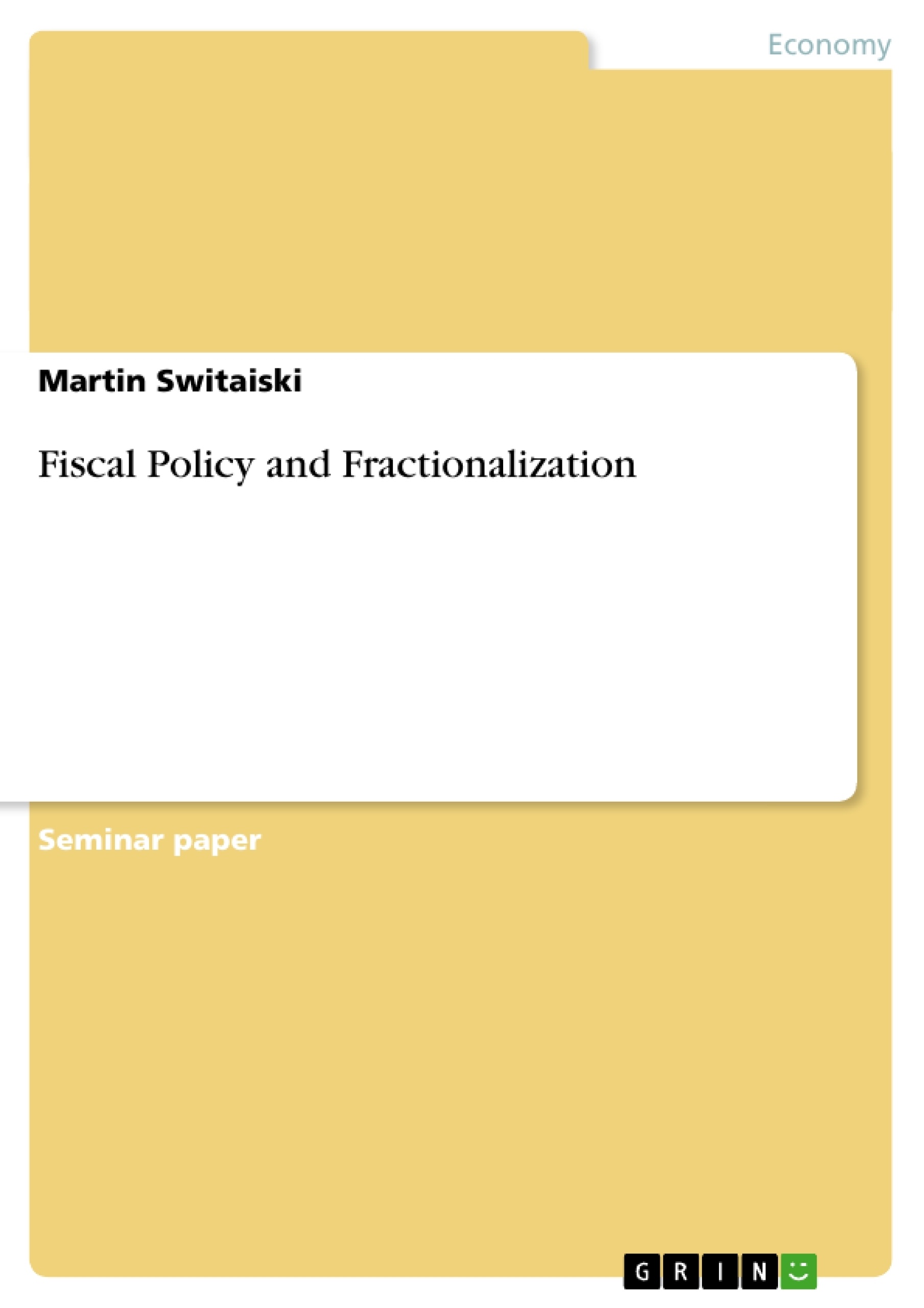Political fragmentation is regularly considered to be a relevant factor
affecting the outcomes of fiscal policy. It is assumed that a fragmented
fiscal policy process leads to higher expenditures and subsequently in a
higher deficit. But “hard evidence” in support of this hypothesis is rare, and
conclusions can only be drawn very carefully. The present paper gives an
overview of the existing literature on the role of (size) fragmentation and its
effects on fiscal policy outcomes. The main focus is on the work contributed
by Yianos Kontopoulos and Roberto Perotti, who used a panel of 20 OECD
countries over 1960-1995 for their analysis of government fragmentation.
Inhaltsverzeichnis (Table of Contents)
- Introduction
- Research Overview
- Kontopoulos and Perotti's Model
- Results and Robustness
- Conclusion
Zielsetzung und Themenschwerpunkte (Objectives and Key Themes)
This paper examines the relationship between fiscal policy fragmentation and its impact on fiscal outcomes, particularly focusing on the work of Kontopoulos and Perotti. It explores the common pool model and the concept of internalized costs, demonstrating how fragmentation can lead to higher expenditures and budget deficits.
- The effect of political fragmentation on fiscal policy outcomes
- The role of size fragmentation in fiscal decision-making
- The common pool model and its implications for fiscal discipline
- The concept of internalized costs and its relationship to fragmentation
- Empirical evidence on the relationship between fragmentation and fiscal outcomes
Zusammenfassung der Kapitel (Chapter Summaries)
- Introduction: The paper introduces the concept of fiscal fragmentation and outlines the common view that a fragmented decision-making process leads to higher expenditures and budget deficits. It highlights the work of Kontopoulos and Perotti, who examined the effects of size fragmentation on fiscal outcomes.
- Research Overview: This chapter provides a brief overview of the existing literature on the relationship between fragmentation and fiscal outcomes, highlighting the “weak government” hypothesis proposed by Roubini and Sachs and its subsequent critique by other researchers.
- Kontopoulos and Perotti's Model: This chapter focuses on the research conducted by Kontopoulos and Perotti, explaining their model and the methodology used to analyze the relationship between fragmentation and fiscal outcomes. It emphasizes their focus on executive fragmentation and their use of cabinet size as a key indicator.
- Results and Robustness: This chapter summarizes the findings of Kontopoulos and Perotti's analysis, examining the impact of size fragmentation on fiscal outcomes and assessing the robustness of their results across different economic scenarios.
Schlüsselwörter (Keywords)
This paper explores the relationship between fiscal policy fragmentation, size fragmentation, executive fragmentation, the common pool model, internalized costs, and fiscal outcomes. It analyzes empirical data to investigate the impact of political fragmentation on government expenditures and budget deficits.
Frequently Asked Questions
How does political fragmentation affect fiscal policy?
It is generally assumed that a fragmented decision-making process leads to higher government expenditures and larger budget deficits due to competing interests.
What is the "common pool model" in fiscal policy?
The common pool model suggests that when multiple actors can draw from a single budget without bearing the full cost of their spending, it leads to overspending and fiscal indiscipline.
Who are Kontopoulos and Perotti in the context of fiscal research?
Yianos Kontopoulos and Roberto Perotti are researchers who analyzed size fragmentation in 20 OECD countries, focusing on how cabinet size affects fiscal outcomes.
What is "size fragmentation" in government?
Size fragmentation refers to the number of participants in the fiscal process, such as the number of ministers in a cabinet or parties in a coalition.
Is there strong empirical evidence for the fragmentation hypothesis?
While the theory is widely accepted, researchers note that "hard evidence" is rare and conclusions regarding the impact on deficits must be drawn carefully.
- Quote paper
- Martin Switaiski (Author), 2004, Fiscal Policy and Fractionalization, Munich, GRIN Verlag, https://www.grin.com/document/22540



